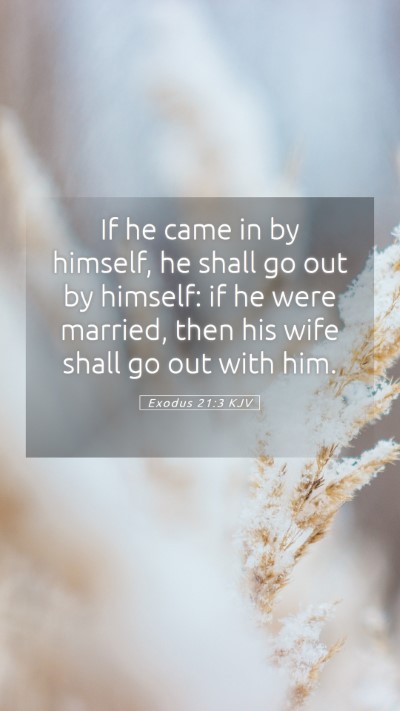Understanding Exodus 21:3 - A Comprehensive Bible Verse Commentary
Exodus 21:3 states, "If he comes in by himself, he shall go out by himself; if he comes in married, then his wife shall go out with him." This verse falls within the legal framework of ancient Hebrew society concerning servitude.
Contextual Overview
This passage occurs in the section of Exodus that outlines laws governing the treatment of slaves and servants. The surrounding verses focus on the conditions and rights of bondservants, shedding light on social justice in the ancient Near East.
Bible Verse Meanings
Understanding Exodus 21:3 requires us to consider the nature of servitude in ancient Israel:
- The distinction between a servant who is single and one who is married indicates the importance of family dynamics in a servant's status.
- This verse illustrates the concept of rights and responsibilities within the covenant community.
- It signifies that entering servitude does not erase prior familial obligations.
Insights from Public Domain Commentaries
Matthew Henry's Commentary
Matthew Henry emphasizes the idea that this regulation sets boundaries on the treatment of servants. It reveals God's concern for the welfare of individuals in servitude, ensuring that marital bonds are acknowledged and respected. He notes that this law ensures that a spouse who had been part of a servant's life cannot be arbitrarily taken away in the event of discharge.
Albert Barnes' Notes on the Bible
Albert Barnes outlines the pragmatic aspects of this law. He suggests that it delineates the conditions under which servants are released, and hence offers insight into the expectations of both servants and masters. The provision for a servant’s family is intended to foster loyalty and encourage good treatment by employers.
Adam Clarke's Commentary
Adam Clarke elaborates on the social implications of this verse, stating that it reflects a balance between servitude and personal rights. He adds that this law serves as an ethical directive in a system dependent on servile labor, advocating for the dignity of family life against the backdrop of servitude.
Applications to Modern Life
In examining Exodus 21:3, contemporary applications may revolve around:
- The significance of family integrity in work-related circumstances.
- Understanding how historical laws provide lessons on ethics and justice that can be applied today.
- Lessons on personal and familial rights within contractual obligations.
Cross References
Related scripture that complements this understanding includes:
- Exodus 21:2 - Additional laws governing servitude.
- Deuteronomy 15:12-15 - Discussion of Hebrew servants and their release.
- Leviticus 25:39-41 - Insights on redemption and family in servitude contexts.
Conclusion
Exodus 21:3 serves as a vital piece of biblical jurisprudence that reflects broader themes of justice, family dynamics, and societal responsibility. Through a combination of scholarly commentary, it is clear that this verse holds significant implications, not only for ancient Israelite society but for modern biblical studies and ethical frameworks as well.
Further Bible Study Insights
For those engaged in Bible study groups or seeking Bible study tools, exploring the context and implications of verses like Exodus 21:3 can enhance Bible study lessons and deepen understanding.


